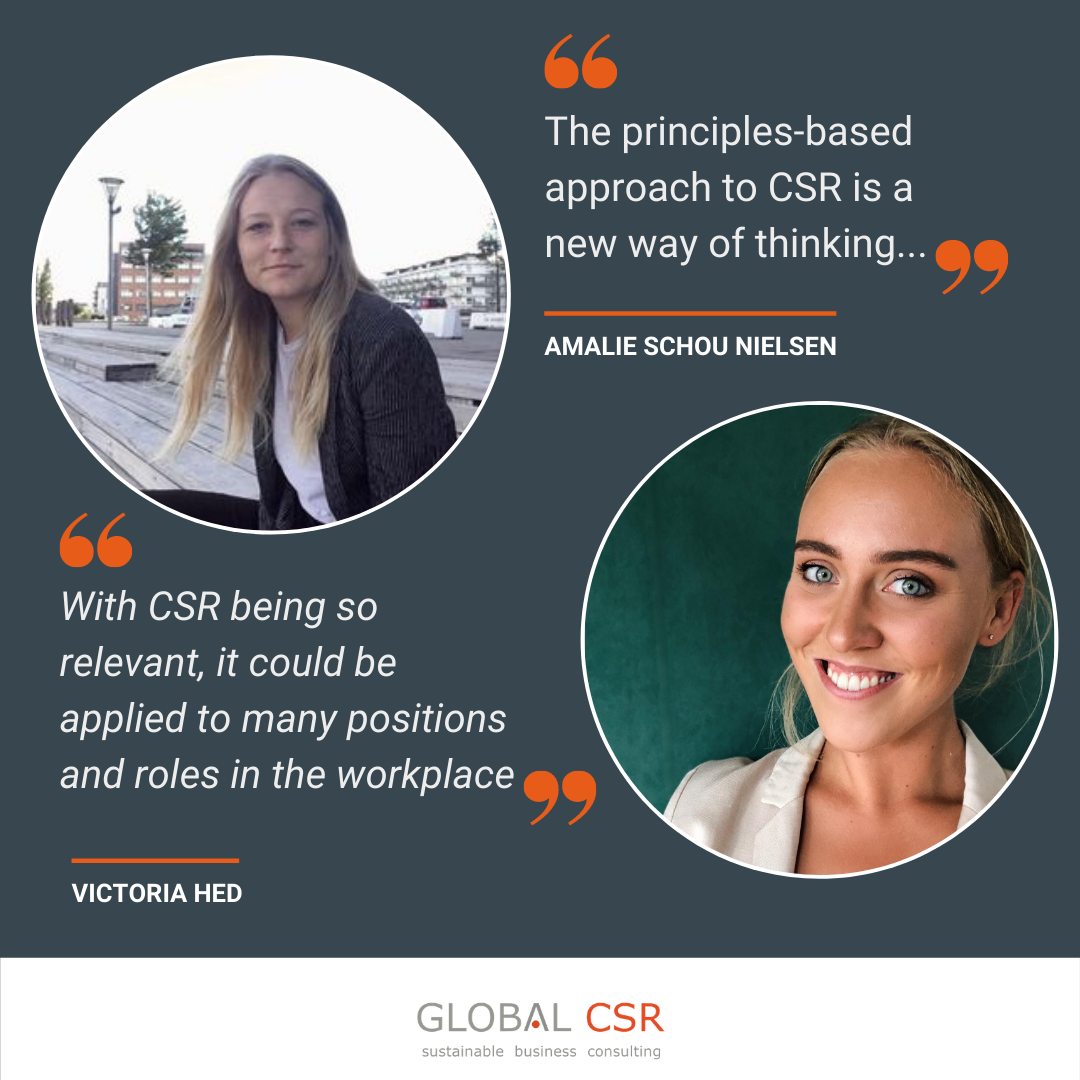Interview with former interns
“I learned to use the UNGPs and the OECD Guidelines”
Last week we had the chance to catch up with Amalie Schou Nielsen and Victoria Hed, who interned at GLOBAL CSR during Spring 2020. We heard about their experience at GLOBAL CSR, as well as why they are interested in CSR and what they want to do in the future.
Amalie Schou Nielsen is due to finish her studies in Business and Development Studies at CBS. She recently finished her internship report about sustainable investments focusing on the new EU Taxonomy on sustainable financing. Victoria Hed is concluding her Bachelor’s Degree in Business Administration and Hospitality Management and used the internship at GLOBAL CSR to focus her competency toward sustainability.

What caught your interest with CSR?
Amalie: For me it is the importance of businesses taking responsibility. They have such a big impact on the world. If we want sustainable development, we need the businesses along. My studies did not focus much on the UNGPs, so I wanted to get a more pragmatic understanding of CSR, something I saw possible at GLOBAL CSR.
Victoria: It is similar for me; sustainability is such a huge part of the debate today. States are moving quite slow, so I think the main reason why I am interested in CSR is that companies can be more flexible and quicker in the changes they make. GLOBAL CSR caught my interest because one of the main things that I was struggling with was the implementation of CSR and the KPIs (key performance indicators). I wanted to learn how corporate responsibility is measured and GLOBAL CSR´s pragmatic approach was therefore interesting to me.
What was the best part of your internship?
Victoria: Working with Amalie! We had a lot of fun! It is a very open and accepting environment. It is an internship that is quite clearly, in retrospect, designed to have you learn a lot. With mandatory due diligence likely becoming a legal requirement in the EU, being able to understand that and know what it means is a huge asset.
Amalie: To be able to learn from experts in the field has made the learning curve at GLOBAL CSR really great. The internship has given me a thorough understanding of the UNGPs and the OECD Guidelines.
Do you think that your knowledge of CSR changed when working at GLOBAL CSR?
Amalie: For me, it changed quite a bit. I mainly had a focus on strategic CSR and what businesses should do when they enter a new market in economic developing countries. At GLOBAL CSR, I learnt to use the UNGPs and OECD Guidelines. I also learnt that businesses should align with the UNGPs themselves, before requiring it from suppliers and other business relationships.
Victoria: I can only agree with Amalie. Working with Sune, who has worked with CSR and with the UNGPs for so long was really an advantage, but it does take time to get used to the language. In hospitality, sustainability entails a lot of marketing. It sounds harsh, but there are a lot of efforts that are not necessarily that major, but are being marketed as saving the world. I think that scaling it back and learning to work with the basics as a foundation for future strategic development is really useful. Something else that I gained during the internship is the differentiation of responsibility between states and businesses.
What distinguishes GLOBAL CSR´s approach to CSR from other consultancies?
Amalie: At GLOBAL CSR they have this principles-based approach to CSR. I think their approach is not very common in Western countries and for Western businesses, who are used to thinking that human rights issues are only relevant in developing economies. GLOBAL CSR recognises that businesses can impact rights everywhere, no matter the location.
Victoria: I agree. Working with the minimum standard is super useful and quite unique to GLOBAL CSR, whereas other consultancies might have a more strategic focus.
How do you plan to use the knowledge you obtained from the internship in the future?
Amalie: I think it will be impossible for me not to use the knowledge I gained in my future work. And it is also something that has had an impact on me on a personal level and my view on many issues.
Victoria: It is a framework that gives you analytical skills on a different level. It is a way of analysing that will be useful regardless of the job we will end up with in the future. With CSR being so relevant, it could be applied to many positions and roles in the workplace, even if it is not a clean-cut CSR position.
